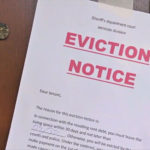Life is not a quiet event. However, if you live on rental property or manage an apartment building, you have to balance your own needs with your neighbor’s.
Noise complaints do not immediately result in eviction notices. With that said, a persistent disregard for the needs of your neighbors can see landlords take serious action in response.
Renters: How Many Noise Complaints Until Eviction?
Each tenant around your property is entitled to what’s known as “quiet enjoyment” of one’s property. This quiet does not dictate that all of a tenant’s neighbors be perfectly quiet all of the time. Instead, it suggests that tenants who exceed what may be considered to be a “reasonable” noise limit may face some degree of retribution.
The tricky part is that what’s “reasonable” can vary from person to person. For example, heavy footsteps may go unnoticed by some while irritating others.
Landlords cannot evict other tenants based on personal irritations. However, tenants who document irritating noises and try to negotiate peace with their neighbors on their own may have the materials they need to encourage an eviction.
Looking Through Your Lease
Landlords, more specifically, can specify caveats detailing how many noise complaints until eviction a tenant may receive. If, for example, a noise complaint results in a visit to an apartment complex by the police, then landlords may have the grounds to issue tenants an eviction warning.
This right, however, depends both on the rules stipulated in a tenant’s lease and landlord laws. Landlords, by right, are required to issue warnings to a tenant accused of excessive noise before presenting an eviction notice. What’s more, landlords may only act in this regard if they establish noise regulations in their leases.
With that in mind, landlords can establish quiet hours or otherwise set noise limits that allow them more control over a tenant’s lease. Any tenants, then, who agree to these caveats can face serious consequences if they get caught violating a landlord’s rules.
Landlords: How Many Noise Complaints Until Eviction?
Tenants are more sensitive to the day-to-day goings-on of an apartment complex than many off-site landlords. That doesn’t, however, mean that tenants are always in the right when complaining about their neighbors.
Landlords, with that in mind, have to take noise complaints with a grain of salt. Not only can tenants file these complaints maliciously, but landlords are also not allowed to evict tenants after a single complaint. Instead, landlords must go through a process to ensure a tenant is within their rights before removing that tenant from their property.
Clarify Limitations in Your Lease
As noted, tenants control the flow of information between themselves and a landlord, especially when it comes to noise complaints. Landlords, then, can usually only act against another tenant if a resident brings a noise complaint to their attention.
That said, visits to an apartment complex by police officers can also spur a landlord into action. A landlord’s rights in these circumstances depend on the clauses they’ve included in a tenant’s contract.
Landlords can establish quiet hours or limit how many guests tenants may have in their apartments at one time. What’s more, landlords can also specify that visits to a complex by law enforcement can result in warnings or evictions.
However, landlords are required to issue tenants a noise warning before moving forward with the eviction process. If noise complaints seem to get out of control, landlords are even specifically encouraged to negotiate peace between two feuding tenants. Only after a landlord has made motions such as these can they begin the eviction process.
Noise Complaints and Subleased Units
If tenants sublease their units, the question of noise complaints and related rights becomes complicated. To sublease a unit, a lot’s original tenant gives the property over to another party while retaining control over the delivery of rent and utility bills.
To what degree the subleaser retains responsibility for the sublessee’s behavior depends on the landlord. If, however, the sublessee is removed from a subleased property, then the original tenant will still be expected to see rent payments through until the end of their original contract.
How Many Noise Complaints Until Eviction? Know Your Rights
Tenants hold the most control over the delivery and response to noise complaints in their apartment complexes. Landlords, after all, may not know about a noise violation until someone else brings it to their attention.
With that being said, landlords are expected to undertake several cursory steps before evicting a tenant for noise violations. If you, then, have been accused of violating quiet hours or otherwise making too much noise, you have time before you have to start looking for a new apartment. However, that also means that your annoying neighbor is entitled to the same rights.
Want to learn more about landlords’ rights? Explore the PayRent platform. This platform makes it easier than ever for tenants to communicate with their landlords and vice versa.










